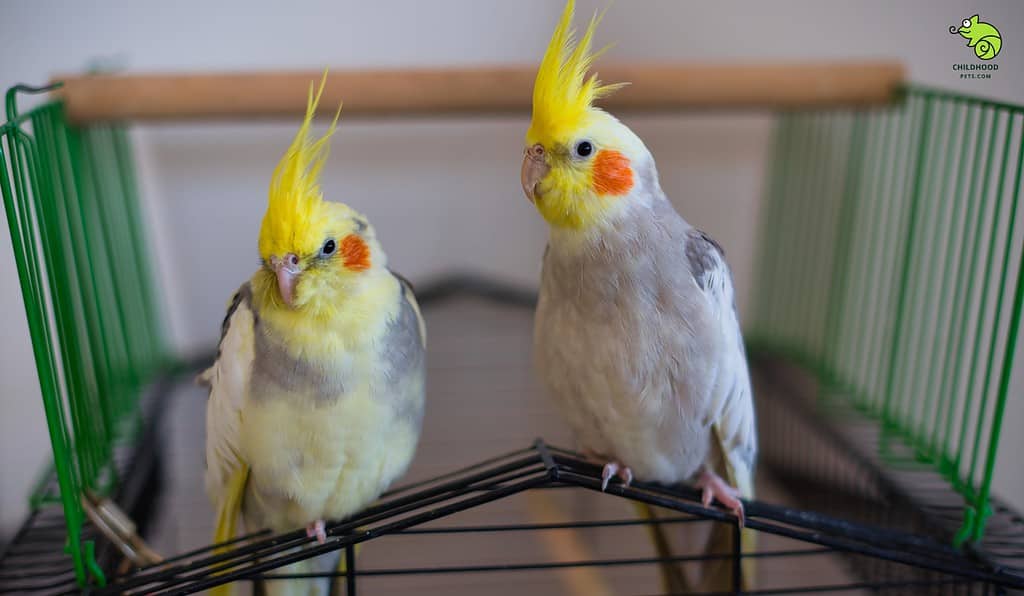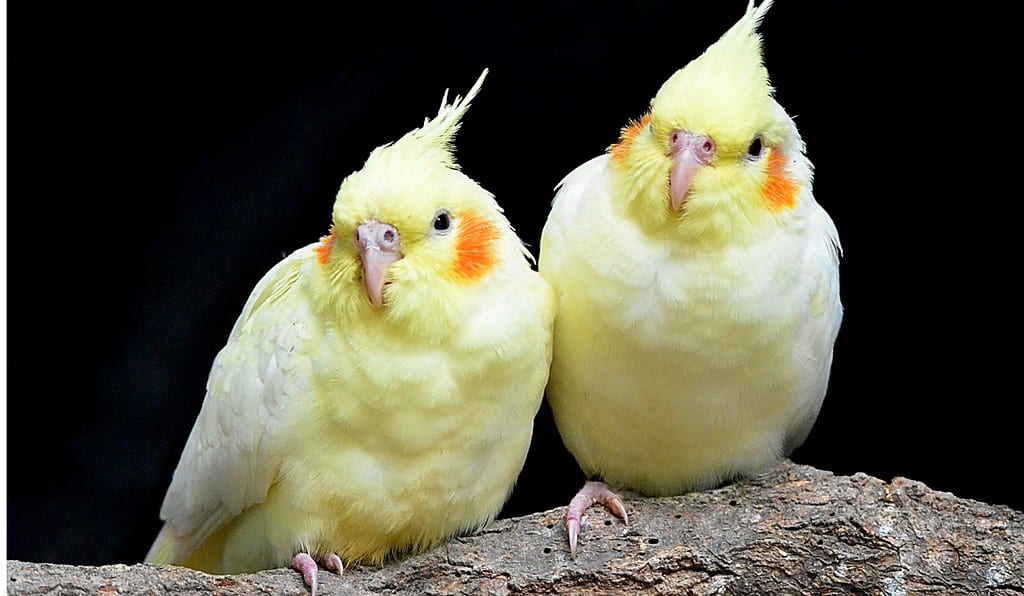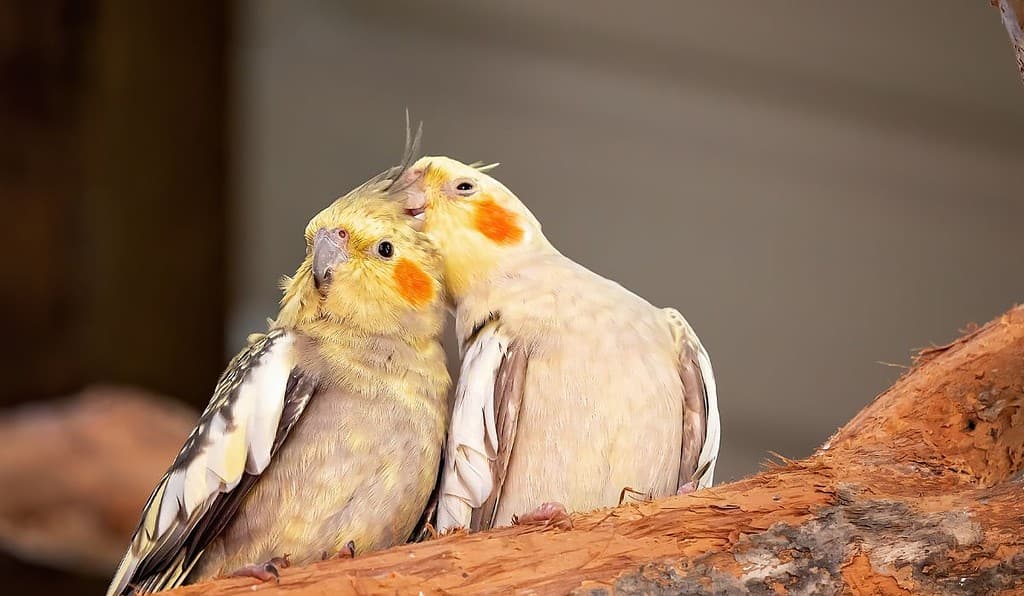
Cockatiels, with their vibrant personalities and striking appearances, have become a favorite among bird enthusiasts. Originating from the vast landscapes of Australia, these birds are known for their social nature, often seen in large flocks in the wild. However, many pet owners find themselves facing a dilemma: Is it okay to keep a single cockatiel, or do these birds need companionship to truly thrive
On average cockatiels don’t prefer solitude. In their natural habitat, they live in large flocks, and when isolated, they can become stressed, leading to destructive behaviors like biting and self-mutilation. It’s essential to provide ample interaction of at least 2-3 hours of socialization daily.
Curious about the intricacies of cockatiel companionship? Dive in as we explore the balance between solitude and social interaction for these charming birds, ensuring they lead a life filled with chirps of joy and contentment.
The Social Nature of Cockatiels
In the wild, cockatiels thrive in large flocks, soaring through the skies and communicating with their peers. This flock mentality isn’t just for fun; it’s a survival mechanism that has been ingrained in them over countless generations.
When domesticated, this inherent need for social interaction doesn’t just disappear. Many new bird owners come to me with concerns about their single cockatiel, wondering if their feathered friend is feeling lonely or isolated.
Comparison of Wild vs. Domesticated Cockatiels:
| Behavior Aspect | Wild Cockatiels | Domesticated Cockatiels |
| Social Interaction | Live in large flocks | Often kept solo |
| Communication | Constant chirping with flock members | May chirp or call for human attention |
| Survival Mechanism | Rely on flock for safety and food | Depend on human caregivers |
| Emotional Needs | Fulfilled through flock interactions | May require more human interaction |
| Response to Threats | Flock provides safety in numbers | May feel vulnerable when alone |
Do Cockatiels Prefer To Be Alone?

As a whole, Cockatiels are social birds and usually prefer companionship, either from their human owners or other cockatiels, rather than being alone. Solitude can lead to loneliness and stress in these birds. In the wild, they typically bond with a mate and care for each other, which highlights their social nature.
However, their preference between human companionship and the companionship of other cockatiels may vary based on individual personality traits. Some cockatiels may prefer socializing with other cockatiels over human interaction.
Can Cockatiels Die of Loneliness?
As a whole, Cockatiels can suffer from loneliness, which can lead to stress and depression. While they don’t directly die from loneliness, its effects can weaken their immune system and make them prone to illnesses.
A lonely cockatiel might refuse to eat, leading to malnutrition, or engage in self-harming behaviors.
Behavior of Lonely vs. Social Cockatiels:
| Behavior Aspect | Lonely Cockatiels | Social Cockatiels |
| Vocalization | Reduced or none | Regular chirping and singing |
| Eating Habits | Irregular, may refuse food | Healthy appetite |
| Interaction with Humans | Fearful or aggressive | Friendly and curious |
| Sleep Patterns | Irregular, may sleep more | Regular sleep cycles |
| Overall Health | Risk of health issues due to stress | Generally healthier |
Why Cockatiels Get Lonely
Cockatiels are known for their intelligence, which necessitates a good amount of social interaction and mental stimulation to keep them healthy. Their group-oriented nature provides safety, companionship, and shared knowledge about food and shelter locations. When left alone without the necessary engagement, they can become depressed despite having ample fresh food and water.
Cockatiels miss the constant interaction and stimulation they naturally receive in flocks, leading to feelings of loneliness and stress. This social dependency is deeply ingrained in their behavior, making companionship essential for their well-being.
Benefits of Living in Flocks vs. Living Alone:
| Aspect | Living in Flocks | Living Alone |
| Safety | Predators deterred by large numbers | Vulnerable to threats |
| Social Interaction | Constant companionship and interaction | Limited to human interaction |
| Learning | Shared knowledge and skills | Relies on human for stimulation |
| Emotional Well-being | Emotional needs met by peers | Risk of loneliness and depression |
| Behavioral Stimulation | Natural behaviors like foraging | May develop behavioral issues |
Signs of Distress in a Lonely Cockatiel
One of the most common questions I get as a veterinarian is about the emotional well-being of a solo cockatiel. It’s heartbreaking to see a once lively and chirpy bird become quiet and withdrawn due to loneliness. The emotional and behavioral consequences can be profound.
- Reduced chirping or singing.
- Loss of appetite or irregular eating patterns.
- Aggressive behavior or biting.
- Plucking of their own feathers.
- Reduced interest in toys or play.
- Hiding or staying at one spot in the cage for extended periods.
How To Reduce Stress in Cockatiels
It is suggested that keeping two cockatiels together is a method to provide them with a happy and stress free life. Cockatiels thrive in pairs or small flocks as the companionship provides added stimulation, reduces stress, and enhances their overall health and well-being. A companion can also help in mitigating loneliness, which is crucial for their mental health.
In many cases, owners keep a male and a female cockatiel together for companionship, and they make great partners. However, it’s also possible to keep two male cockatiels together, showcasing the flexibility and benefits of keeping two cockatiels for their overall happiness.
Ways to Interact and Bond with Your Cockatiel

Every time a bird owner tells me their cockatiel seems “off,” my first question is about their interaction time. Cockatiels have unique emotional needs, and as their caregivers, it’s our responsibility to ensure those needs are met. Over the years, I’ve found that consistent, meaningful interaction can make all the difference in a cockatiel’s well-being. Here is what you should do to interact and make a strong bond with your cockatiel.
- Talk to Them: Regularly speaking to your cockatiel fosters a bond and helps them recognize your voice.
- Playtime Outside the Cage: Let them out under supervision for some free flight and exploration.
- Teach Them Tricks: Cockatiels are intelligent and can learn a variety of tricks, from simple commands to more complex tasks.
- Listen to Music Together: Many cockatiels enjoy music and may even dance or sing along!
- Shared Meals: While ensuring the food is safe for them, sharing meals can be a bonding experience.
How Much Attention Do Cockatiels Need?
Cockatiels require three to four hours of human interaction daily, especially if they don’t have a bird companion. It’s advised to spend about an hour with them in the morning, another hour between the first session and dinner, and an additional one to two hours after dinner.
A minimum of two hours of one-to-one attention each day is recommended. If this isn’t feasible due to your schedule, considering getting another cockatiel to keep your existing one entertained.
Daily Needs of a Domesticated Cockatiel:
- Interaction: At least 1-2 hours of direct interaction.
- Playtime: A minimum of 30 minutes outside the cage.
- Training: Short, regular sessions for mental stimulation.
- Vocalization: Encourage singing and talking.
- Diet: Balanced meals with fresh fruits, vegetables, and cockatiel-safe foods.
How Long Can I Leave My Cockatiel Alone?
Ideally, it’s best not to leave cockatiels alone for more than 8 hours daily as they are social animals and require interaction and mental stimulation to stay healthy. The exact amount of time a cockatiel can be left alone may also depend on the individual bird’s temperament, the environment, and whether they have other companions or stimulating toys to keep them engaged.
If necessary, cockatiels can be left alone for a period ranging from 8 to 24 hours, provided they have enough water, food, and mental stimulation. However, this should not be a regular practice, because this may cause them stress or separation anxiety if it becomes a routine.
Recommended Durations for Leaving a Cockatiel Alone:
| Scenario | Recommended Duration | Notes |
| Daily Work Routine | 8-10 hours | Ensure toys and entertainment are available. |
| Overnight Stay | 24 hours | Make sure they have enough food and water. |
| Weekend Getaway | 48 hours (with precautions) | Consider having someone check on them or use automated feeders. |
| Extended Vacation | Not recommended | It’s best to have someone care for them or consider boarding facilities. |
The Benefits of Keeping Two Cockatiels
Keeping two cockatiels can be significantly beneficial for their health and overall well-being.
- Having a companion provides cockatiels with physical and emotional stimulation. They can groom each other, which not only keeps them clean but also provides essential social interaction. This companionship can be especially beneficial when you are not at home to interact with them.
- Cockatiels are social birds by nature. Having a companion allows them to maintain a healthy social life as they can interact, preen each other, cuddle, and play games together. This interaction can also help in reducing stress levels, making them feel secure and content.
Understanding the social needs of cockatiels is paramount for any bird owner. These charming birds, with their lively personalities, deserve a life filled with love, interaction, and proper care. I’ve seen the profound difference that understanding and meeting these needs can make in a cockatiel’s life. So, whether you’re considering getting a cockatiel or already have one, always remember that their emotional well-being is as important as their physical health.
